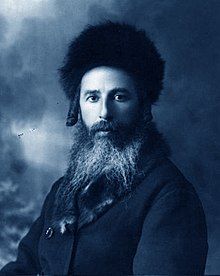Chaim Yehuda Leib Auerbach
Rabbi Chaim Yehuda Leib Auerbach | |
|---|---|
 | |
| Personal life | |
| Born | Chaim Yehuda Leib Auerbach 1883 |
| Died | 26 September 1954 |
| Spouse | Tzivia Porush |
| Children | Shlomo Zalman Avraham Dov Eliezer Refoel Dovid Leah (wife of Shalom Schwadron) Malka Rochel |
| Parent |
|
| Religious life | |
| Religion | Judaism |
Chaim Yehuda Leib Auerbach (1883 – 26 September 1954) was a haredi rabbi and rosh yeshiva (dean) of Shaar Hashamayim Yeshiva in Jerusalem, which he helped found in 1906. He was the father of the posek (decider of Jewish legal issues) Shlomo Zalman Auerbach.
Family
[edit]His father was Avraham Dov Auerbach, the rebbe of Chernowitz in Poland.[1]
Auerbach married Tzivya, the daughter of Shlomo Zalman Porush, a rabbi who founded the Jerusalem neighborhood of Sha'arei Hesed.[2] Their first son, the authority on Jewish law Shlomo Zalman Auerbach,[3] was the first child born in Sha'arei Hesed.[4] The family lived in poverty.[5]
He wrote a Torah commentary called Chacham Lev.[6]
He died on 26 September 1954 (28 Elul 5714), a month after having a heart attack.[6]

Shaar Hashamayim Yeshiva
[edit]Auerbach and his friend Shimon Tzvi Horowitz opened a yeshiva for the study of the kabbalah as interpreted by the 16th century rabbi Isaac Luria[6] in the Old City of Jerusalem, with a Talmud Torah, a yeshiva ketana, a yeshiva gedola, and a kollel for married students.[6][7]
Auerbach was rosh yeshiva of Shaar Hashamayim Yeshiva from 1906 until his death in 1954 and was succeeded in the post by two of his sons, first Eliezer Auerbach was rosh yeshiva and then Refoel Dovid Auerbach. His eldest son, Shlomo Zalman Auerbach, served as president of the yeshiva; after his death, his son, Shmuel Auerbach, succeeded him.[6]
References
[edit]- ^ Schwartz (1996), p. 34.
- ^ Schwartz (1996), pp. 32–33.
- ^ Schwartz (1996), p. 26.
- ^ Sofer, D. "Rav Shlomo Zalman Auerbach zt"l". Yated Ne'eman (United States). Archived from the original on 31 July 2010. Retrieved 19 December 2010.
- ^ Lazewnik (2000), pp. 43 & 48.
- ^ a b c d e Rossoff, Dovid (2005). קדושים אשר בארץ: קברי צדיקים בירושלים ובני ברק [The Holy Ones in the Earth: Graves of the Righteous in Jerusalem and Bnei Brak] (in Hebrew). Jerusalem: Machon Otzar HaTorah. p. 425.
- ^ Rossoff, Dovid (2005). קדושים אשר בארץ: קברי צדיקים בירושלים ובני ברק [The Holy Ones in the Earth: Graves of the Righteous in Jerusalem and Bnei Brak] (in Hebrew). Jerusalem: Machon Otzar HaTorah. p. 425.
Sources
[edit]- Lazewnik, Libby (2000). Voice of Truth: The life and eloquence of Rabbi Sholom Schwadron, the unforgettable Maggid of Jerusalem. Brooklyn, N.Y.: Mesorah Publications. p. 29. ISBN 9781578195008.
- Schwartz, Rabbi Yoel (1996). The Man of Truth and Peace: Rabbenu Shlomo Zalman Auerbach zt"l. Kest-Lebovits Jewish Heritage and Roots Library.
Further reading
[edit]- Meir, Jonatan. "The Imagined Decline of Kabbalah: The Kabbalistic Yeshiva Sha'ar ha-Shamayim and Kabbalah in Jerusalem in the Beginning of the Twentieth Century" in Kabbalah and Modernity. Boaz Huss, Marco Pasi, and Kocku von Stuckrad, eds. Brill: Leiden & Boston, 2010, pp. 197–220.
